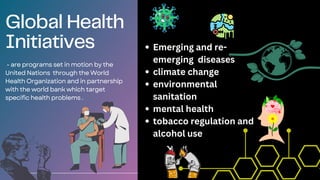"A Deep Dive Into Global Health Initiatives: Impact and Challenges"
Worldwide Wellbeing Drives: A Comprehensive Outline
Global health initiatives (GHIs) are coordinated efforts aimed at addressing critical health challenges across the globe. From eradicating life-threatening diseases to promoting equitable healthcare access, these initiatives play a vital role in improving the quality of life for millions, especially in low- and middle-income countries. This article explores the significance of GHIs, their core objectives, notable programs, and the challenges they face in fostering a healthier global community.
Understanding Global Health Initiatives
Global health initiatives are programs, organizations, or strategies designed to tackle health issues that transcend national boundaries. These efforts typically focus on addressing communicable diseases, maternal and child health, nutrition, sanitation, and access to essential medications. The ultimate goal is to reduce health disparities and promote well-being across diverse populations.
GHIs are often led by international organizations, governments, non-governmental organizations (NGOs), private entities, and charitable foundations. Examples include the World Health Organization (WHO), the Global Fund to Fight AIDS, Tuberculosis, and Malaria, and initiatives supported by organizations like the Bill & Melinda Gates Foundation.
InitiKey Objectives of Global Healthatives
Disease Prevention and Eradication
GHIs aim to combat diseases through vaccination programs, research, and public health campaigns. Notable successes include the eradication of smallpox and ongoing efforts against polio and malaria.Advancing Universal Health Coverage (UHC)
Ensuring everyone has access to essential health services without financial hardship is a central goal of GHIs. This aligns with the United Nations' Sustainable Development Goal 3: Good Health and Well-Being.Improving Maternal and Child Health
Many GHIs prioritize reducing maternal and infant mortality by providing prenatal care, safe childbirth practices, and childhood immunizations.Addressing Health Inequalities
GHIs strive to bridge the gap between developed and developing nations by improving healthcare access, infrastructure, and resources.Strengthening Healthcare Systems
Building robust healthcare systems, training healthcare workers, and ensuring the availability of medical supplies are crucial to the success of GHIs.
Notable Global Health Initiatives
The Global Fund
Established in 2002, the Global Fund fights HIV/AIDS, tuberculosis, and malaria, offering financial support for prevention, treatment, and care programs.Gavi, the Vaccine Alliance
Gavi works to improve vaccine access in low-income countries, targeting diseases like measles, pneumococcal disease, and HPV.WHO’s Expanded Program on Immunization (EPI)
Launched in 1974, this program has significantly increased global vaccination coverage, reducing death rates from preventable diseases.UNICEF’s Child Health Programs
UNICEF focuses on combating malnutrition, improving access to clean water, and promoting immunization to enhance child survival rates.PEPFAR (President’s Emergency Plan for AIDS Relief)
This U.S.-funded initiative has provided antiretroviral treatment to millions of people living with HIV/AIDS, especially in sub-Saharan Africa.Roll Back Malaria Partnership
This initiative reduces malaria cases and deaths through prevention measures such as insecticide-treated nets, indoor spraying, and access to effective medications.Bill & Melinda Gates Foundation’s Health Programs
The foundation has been a significant player in global health, funding vaccine development, malaria eradication, and reproductive health services.
Achievements of Global Health Initiatives
Eradication of Smallpox
The global effort to eradicate smallpox culminated in 1980, saving millions of lives and serving as a landmark achievement in public health.Progress Toward Polio Eradication
Intensive vaccination campaigns have reduced polio cases by over 99%, with the disease now confined to a few regions.Decline in Malaria Mortality
Between 2000 and 2020, malaria death rates decreased by 60% globally, driven by targeted interventions from initiatives like the Global Fund and Roll Back Malaria.Advances in HIV/AIDS Treatment
Programs such as PEPFAR and the Global Fund have enabled millions of people living with HIV to access life-saving antiretroviral therapy.Increased Childhood Immunization
Expanded vaccination programs have prevented millions of deaths from diseases like measles, tetanus, and diphtheria.
Challenges Facing Global Health Initiatives
Funding Deficits
Many GHIs depend on donor funding, which can be inconsistent due to economic downturns or shifting political priorities.Weak Healthcare Systems
In some low-income countries, inadequate infrastructure and workforce shortages hinder effective program implementation.Emerging Health Threats
Outbreaks of new diseases, such as COVID-19, challenge the global health community to respond quickly while maintaining progress on existing initiatives.Resource Allocation Disparities
Disparities in healthcare access, particularly in rural and marginalized communities, remain a persistent issue.Political and Social Barriers
Conflicts, political instability, and cultural resistance can impede the success of health programs in certain regions.
Emerging Trends in Global Health Initiatives
Digital Health Solutions
Innovations like telemedicine, mobile health apps, and data analytics are transforming healthcare delivery in underserved areas.Focus on Mental Health
GHIs increasingly recognize mental health as a critical component of overall well-being, leading to greater investment in awareness, treatment, and support.Climate and Health Nexus
The intersection of climate change and global health is gaining attention, addressing challenges such as vector-borne diseases and food insecurity.Integration of Universal Health Coverage (UHC)
More initiatives align their goals with UHC principles to ensure equitable healthcare access for all.Strengthened Pandemic Preparedness
In the wake of COVID-19, global health organizations emphasize readiness for future health emergencies.
Conclusion
Global health initiatives are indispensable in addressing the complex health challenges of the modern world. Through international collaboration, innovative solutions, and resource mobilization, these programs have made remarkable strides in improving global health outcomes.
However, ongoing challenges such as funding gaps, systemic inequalities, and emerging threats highlight the need for sustained efforts and renewed commitments. As the world continues to face evolving health issues, the role of GHIs remains crucial in building a healthier, more equitable future for generations to come.



